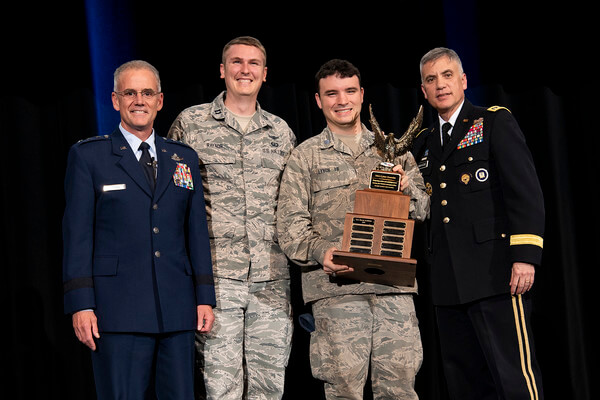Academy cadets take 1st place at NSA-sponsored cyber competition

From left: Lt. Gen. Jay Silveria, superintendent of the U.S. Air Force Academy; Capt. Justin Raynor, a computer science instructor at the Academy; Cadet 1st Class James Lynch; and Gen. Paul M. Nakasone, U.S. Cyber Command commander, director of National Security Agency, and chief of the Central Security Service, at the Academy, April 17, 2019. Lynch was on the team of Academy cadets who took first place at the NSA’s annual Cyber Exercise. (U.S. Air Force photo/Joshua Armstrong)
Story by Ray Bowden, April 23, 2019
U.S. AIR FORCE ACADEMY, Colo. — Cadets at the Air Force Academy grabbed the top slot at the National Security Agency Cyber Exercise, April 15-17.
“Nothing can truly match the fact that the Air Force Academy won the cyber championship — again,” said Academy Superintendent Lt. Gen. Jay Silveria. “I couldn’t be more proud.”
The competition pitted more than 100 cadets and midshipmen from the U.S. service academies against each other in a competition testing their cybersecurity skills, according to a news release from the NSA. During the exercise, cadets and midshipmen worked with NSA personnel to accomplish and evaluate cyber mission strategies and cyber-operations scenarios.
“The team and coaches spent a huge amount of time preparing themselves to compete,” said Col. David Caswell, head of the Academy’s computer and cyber sciences department. “Their victory is a testament to the capability of our cadets, and should give everyone confidence in the lieutenants we’re creating for our Air Force.”
The competition overlapped with the Joint Service Academy Cybersecurity Summit at the Academy, April 17-18.
“It was two full days of world-class discussion panels and exchanging ideas on the toughest problems in Internet security and across the cyber domain,” Silveria said.
The summit was a rare opportunity for cadets and midshipmen to discuss cyber security issues with senior military and public and private sector IT experts and focused on supporting goals presented by the National Security Telecommunications Advisory Committee’s Cyber Moonshot challenge, Caswell said.
“We were able to have robust discussions to develop Grand Challenge ideas that could aid international cyber security,” he said.
Silveria said it’s easy to be lighthearted when congratulating cadets for a cyber-competition win, but he knows computer and cyber sciences cadets take their learning curve at the Academy seriously.
“When you consider the threat the cyber domain poses, our cadets will be among our nation’s first line of defense after they graduate,” Silveria said. “These exercises and these summits add to their knowledge and no doubt help them build a stronger defense.”